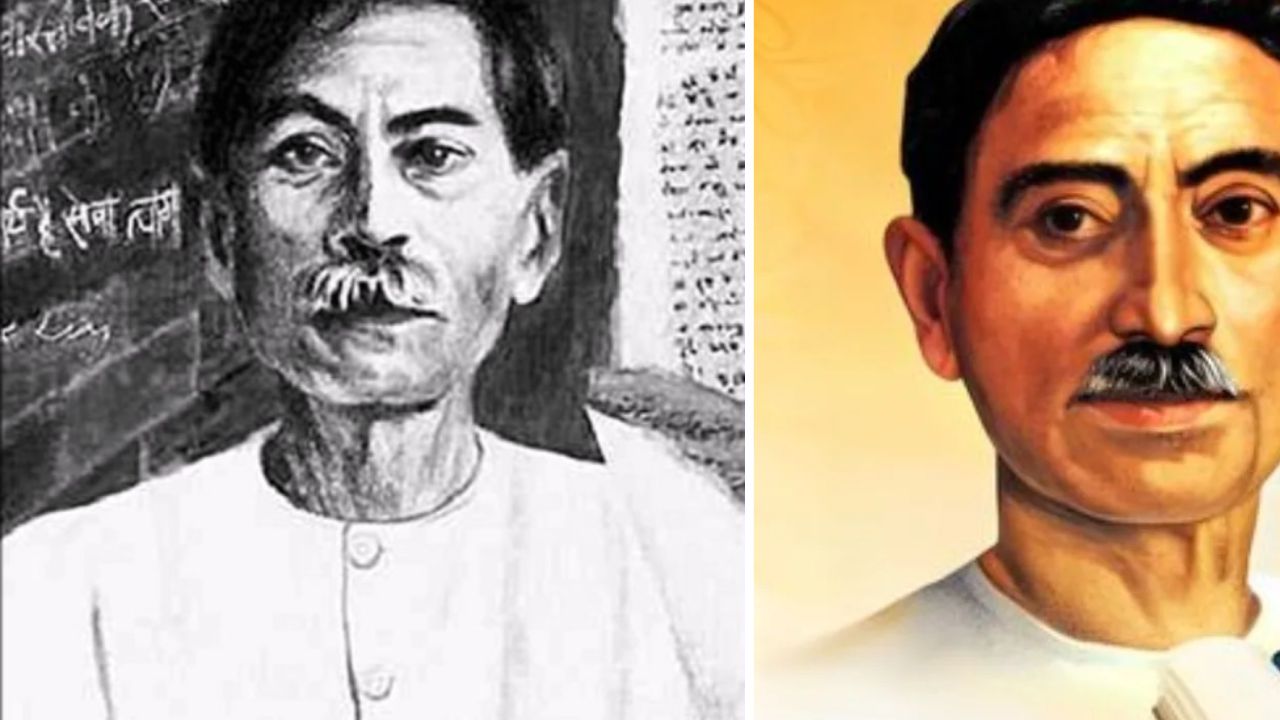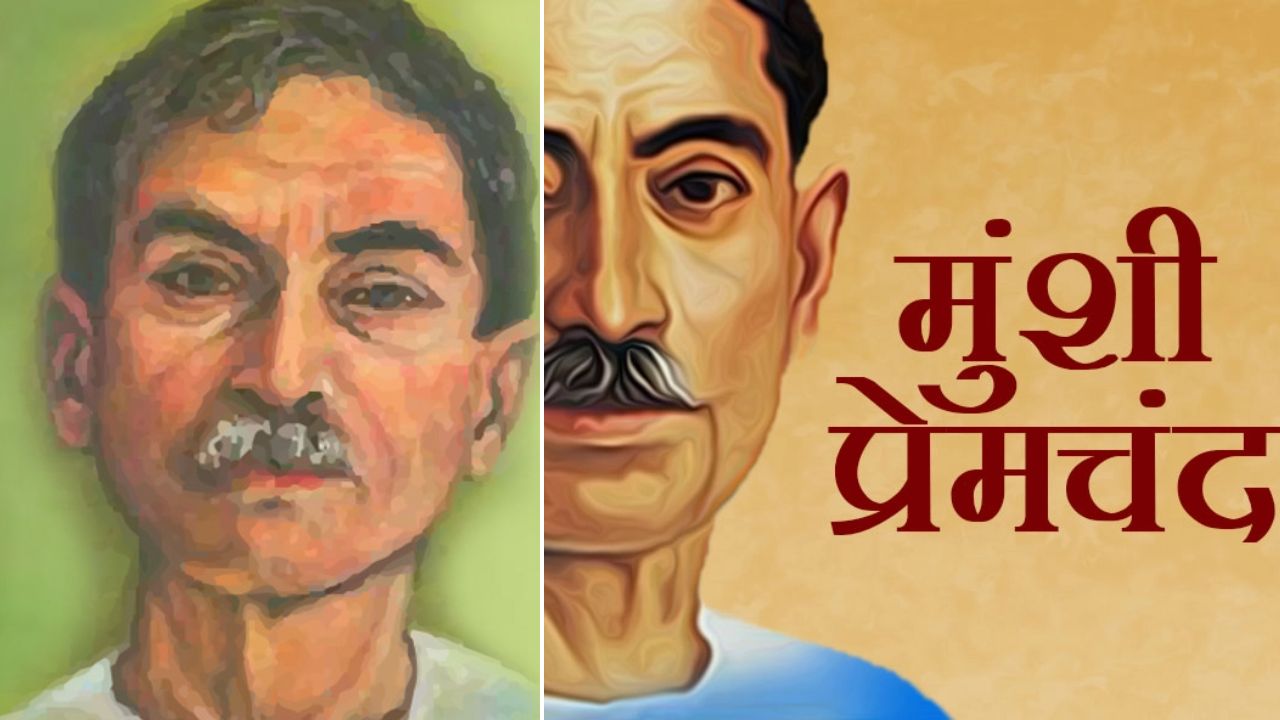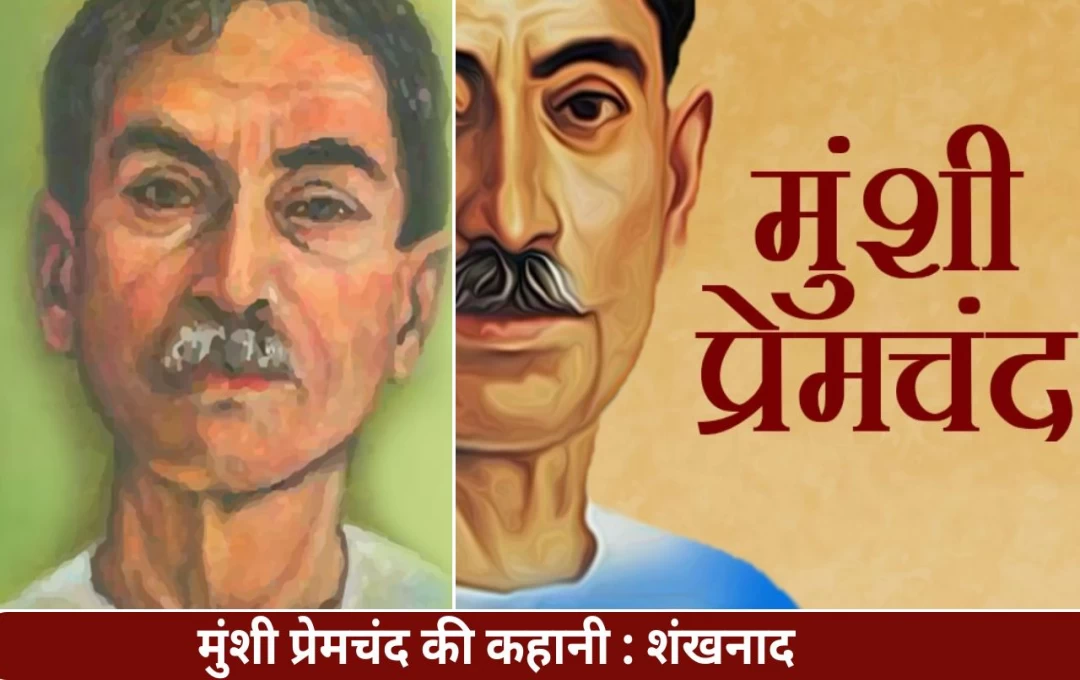Friends, our country has for centuries been the birthplace and land of countless great personalities brimming with virtues – sages, poets, writers, musicians, and many more. The thousands of works created by these luminaries are invaluable. Today's youth, in this digital age, seem to be losing touch with their heritage, drifting further and further from this priceless treasure. subkuz.com continuously strives to bring you these invaluable treasures, along with entertaining stories, news, and information from India and the world. Presented here is one such invaluable and inspiring story by Munshi Premchand.
The Conch Shell’s Sound (Shankhnaad)
Bhanu Chaudhary was the headman of his village, holding great sway. The police inspector wouldn't dare sit on the ground without his permission. Chaudhary Sahib commanded such respect that not a leaf could stir in the village without his consent. Any incident, whether a mother-in-law/daughter-in-law dispute or a land quarrel, was enough to fully engage Chaudhary Sahib's administrative authority. He would immediately arrive at the scene, conduct an investigation, consider all aspects necessary for successfully prosecuting a case, including witnesses and evidence, and deliver a verdict from his court. No one needed to go to a formal court. However, Chaudhary Sahib did charge a fee for this service. If, due to payment difficulties, he had to exercise patience, the village would face chaos; for his patience and the inspector's anger were closely related. In short, Chaudhary's friends and foes alike remained vigilant.
Chaudhary had three capable sons. The eldest, Bitan, was a well-educated man, capable of signing official documents. He was experienced and shrewd. He wore shirts instead of kurtas and sometimes smoked cigarettes, enhancing his prestige. Though the old Chaudhary disapproved of these vices, he was helpless, as Bitan handled all legal matters. Bitan was the epitome of the law, legal sections at his fingertips, a master at assembling witnesses. The middle son, Shan Chaudhary, was an agriculture department official. He was not very intelligent but very hardworking. He could cultivate saffron where even grass wouldn't grow. The youngest son, Guman, was a hedonist and rebellious. During Muharram, he would beat the drum so loudly that it would burst eardrums. He was fond of fishing and a flamboyant youth. When he played the kharaj and sang soulful songs, it captivated everyone. He had a passion for wrestling, traveling miles to participate, but his family was unsympathetic towards his pursuits. His father and brothers considered him a barren field. Scolding, threats, education, advice, affection, and persuasion—nothing affected him. Only his sisters-in-law still held hope, continually trying to guide him. But laziness is a persistent disease. Rarely did a day pass without Guman enduring harsh words from his sisters-in-law. These bitter words sometimes stung his hardened heart, but the wound never lasted more than a night; by dawn, the pain would subside along with his exhaustion. One morning, he washed, picked up his flute, and headed towards the lake.
His sisters-in-law showered him with flowers; the old Chaudhary would change tactics, and his brothers would glare, yet Guman, unwavering in his pursuits, would stride through them like a drunken elephant amongst dogs. Every conceivable method was employed to steer him onto the right path. His father would advise, "Son, choose a path that earns you money and provides for your family. How long will you depend on your brothers? I’m like a ripe mango—I might fall today or tomorrow. Then how will you survive? Your brothers won't even ask; look at the faces of your sisters-in-law. You also have children; how will you support them? If you don't like farming, I'll get you a job in the Kasturi Biliary." Guman would listen silently, but he was like a stone deity, unmoved. His wife bore the brunt of this family’s tyranny. All the household chores fell on her shoulders: collecting cow dung, fetching water, grinding flour, and enduring ceaseless criticism from her sisters-in-law. After a long quarrel with her husband, Guman softened. He went to his father and said, "Get me a shop." The Chaudhary rejoiced, investing several hundred rupees in a clothing store. Guman's luck seemed to change. He had tailored kurtas and dyed a saffron-colored turban. Whether the business thrived or not was irrelevant; he found profit in owning it—a store open with friends around, smoking charas and singing.
“Let’s go, to the banks of Jamuna, you mischievous one!”

Three months passed peacefully. Guman lived lavishly, spending all his capital. Only rags remained. The old Chaudhary was distraught, his sisters-in-law agitated—"Oh God! Our children and we are reduced to rags, not even a decent kurta to our name, and this worthless fellow has squandered the entire shop! How can we face anyone? How will we even enter the house?" But Guman's demeanor remained unchanged; he returned home, resuming his old ways. Bitan, observing his brother's extravagance, grew resentful. "I toil all day, unable to afford a simple kurta, while this cripple spends all day lounging and flaunts his finery? I probably didn't even have such clothes at my wedding.” Shan harbored similar feelings. Finally, this resentment boiled over. One day, Bitan's wife collected all Guman's clothes, doused them in kerosene, and set them alight. The clothes burned to ashes. Guman wept, while his brothers watched. The old Chaudhary, witnessing this, despaired. "This is a fire of hatred that can even burn down the house."
The flames were quickly extinguished, but the fire in their hearts continued to burn. Finally, one day, the old Chaudhary gathered his family to discuss how to resolve the situation. He said to Bitan, "Son, you saw how hundreds of rupees were lost in an instant. This way of life is unsustainable. You're intelligent and handle legal matters; find a solution to save our family from ruin. I wanted to keep everyone together for as long as I live, but God has other plans."
Bitan's shrewdness seemed to vanish before his clever wife's wisdom. He was pondering a response when his wife spoke, "Father, reasoning won’t work anymore. We’re at our wit’s end. A father's pain for his son is immense; the brothers’ pain is far less. I say plainly: Guman is entitled to your earnings; shower him with gold and pamper him. We don't have the strength or the patience. We'll build our own hut. Whatever is ours, we should receive. Let's divide the property. It’s better than a few people laughing at our plight; how much longer can we bear this shame?”
The impact of this forceful speech was evident on Bitan's face. He himself lacked the courage to so clearly articulate this proposal. The shrewd Bitan said solemnly, "The property, whether jointly owned or otherwise, can be divided; there are precedents. The landowner has no right to claim sole ownership."
It was Shan's turn, but the simple farmer, accustomed to following the oxen, found himself speechless on such a complex matter. His forthright wife, following her sister-in-law's lead, resolved the situation. "What my elder sister-in-law said is the only solution. Some toil relentlessly yet lack even basic necessities, while others live in comfort. We cannot survive in such darkness."
Shan readily agreed. The old Chaudhary turned to Guman, "Son, do you agree? It's not too late. This fire can still be extinguished. Work is dear to everyone; idleness is not. What do you say? Will you do some work, or are your eyes still shut?"
Guman lacked patience; he typically ignored such conversations. But his brothers' united front angered him. He said, "I agree with my brothers. I also want to escape this mess. I neither approve nor disapprove. Let those who are destined to grind at the mill do so! I'm destined for peace; why should I thrust my head into the pestle? I don't ask anyone to work for me. Why are you after me? Take care of yourselves. I don't lack half a seer of flour."

Such meetings had happened numerous times, but like many social and political gatherings in this country, they yielded no results. For two or three days, Guman didn’t eat at home; he stayed at Jatan Singh Thakur's gathering place. Finally, the old Chaudhary went and brought him back. The old rut continued.
Like mice in a Pandé house, even Chaudhary's children were wise beyond their years. For them, horses were clay horses and boats were paper boats. Their knowledge of fruits was vast; they considered all fruits except gular and wild berries to be disease-ridden. But Gurdein's cart held such powerful allure that all their wisdom vanished at its call. Even if they were asleep, they would wake up at his approach. Gurdein, an old, grimy man, was a legend amongst mischievous boys; his voice was a magic spell, summoning hordes of children to his cart faster than a swarm of flies to a battlefield. While he had sweets for the children, he had even sweeter words for the mothers. No matter how much a mother refused, citing lack of money, Gurdein would quickly place sweets in the children's hands, saying affectionately, "Don't worry about the money, we'll meet again. Narayan has given you children, and they are my blessings; they sustain my children too. Let’s see how they grow, then we’ll celebrate."
Gurdein's method, though contrary to commercial norms and the proverb "Cash on delivery, no credit," never caused him regret.
It was an auspicious day. The children anxiously awaited Gurdein at their doors. Many enthusiastic boys climbed trees; some even went outside the village. As the sun set, Gurdein appeared. The boys rushed to him, grabbing his clothes, vying for attention. One would invite him to their house; another would extend his invitation. Bhanu Chaudhary's house was the first. Gurdein unloaded his cart. The sweet loot began; a flurry of children and women. A spectacle of joy and sorrow, satisfaction and greed, envy and resentment, hatred and jealousy unfolded. Bitan's wife emerged with her three children. Shan's wife also arrived with her two sons. Gurdein began his sweet talk, placing money in the bag, distributing sweets, and giving blessings. The children, overjoyed, rushed home. If any child in the village benefited from Gurdein's generosity, it was Guman's son, Dhan.
It was difficult for young Dhan to patiently watch his siblings happily devouring sweets. They teased him with the sweets, tormenting him. Poor Dhan cried, clinging to his mother, trying to drag her towards the door, but the helpless mother could do nothing; her heart ached for her child. She had no money. Resentment gnawed at her—for her misfortune, her sisters-in-law's cruelty, and above all, her husband's uselessness. If her husband were capable, why would she have to endure such humiliation? She picked him up, trying to comfort him, "Son, don't cry. Next time Gurdein comes, I'll get you many sweets. I'll even get better sweets from the market; you can eat as many as you like!" Her eyes welled up. "Oh, this unfortunate day will come again, and I’ll have to make these excuses again! My dear child longs for sweets, while no one in this house has a heart!" Dhan wouldn't stop crying; his mother tried everything, even getting angry, slapping him twice, shouting, "Shut up! Are you the only one who deserves sweets? You're not crying over your fate, only wanting sweets!"
Guman, sitting at his room's entrance, watched intently. He loved his son deeply. The slaps pierced his heart like sharp spears. Perhaps that was his intention. A weaver strikes the warp to spin cotton thread.
Just as fire is hidden in stone and water, so too are noble and gentle emotions hidden in the human heart, no matter how cruel or harsh it may be. Guman's eyes welled up. Tears often reveal the purity of our hearts. Guman was awakened. He picked up his son and said sorrowfully to his wife, "Why are you so angry with the child? I am to blame; punish me as you wish. If God wills it, people will respect me and my children in this house from tomorrow. You have awakened me forever today, as if a conch shell’s sound has called me to the path of righteousness."
This is an inspiring story by the great writer Munshi Premchand. We can learn many new things from this story. The entire subkuz team strives to bring inspiring stories to our visitors daily. Keep reading such inspiring and enlightening stories on subkuz.com.





